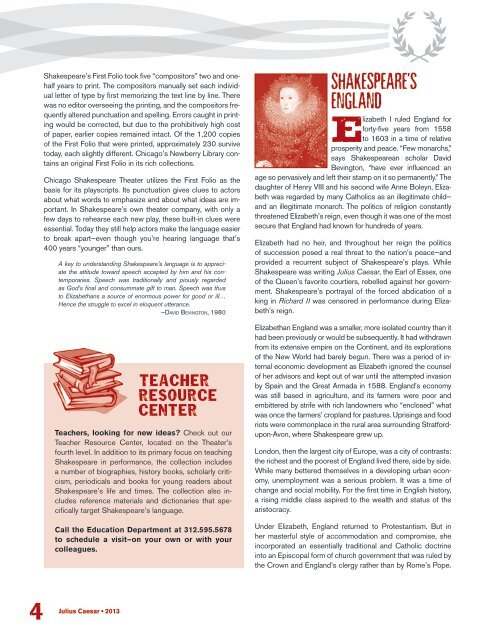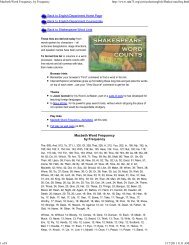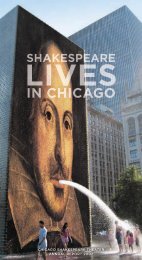Julius Caesar • 2013 - Chicago Shakespeare Theater
Julius Caesar • 2013 - Chicago Shakespeare Theater
Julius Caesar • 2013 - Chicago Shakespeare Theater
Create successful ePaper yourself
Turn your PDF publications into a flip-book with our unique Google optimized e-Paper software.
4<br />
<strong>Shakespeare</strong>’s First Folio took five “compositors” two and onehalf<br />
years to print. The compositors manually set each individual<br />
letter of type by first memorizing the text line by line. There<br />
was no editor overseeing the printing, and the compositors frequently<br />
altered punctuation and spelling. Errors caught in printing<br />
would be corrected, but due to the prohibitively high cost<br />
of paper, earlier copies remained intact. Of the 1,200 copies<br />
of the First Folio that were printed, approximately 230 survive<br />
today, each slightly different. <strong>Chicago</strong>’s Newberry Library contains<br />
an original First Folio in its rich collections.<br />
<strong>Chicago</strong> <strong>Shakespeare</strong> <strong>Theater</strong> utilizes the First Folio as the<br />
basis for its playscripts. Its punctuation gives clues to actors<br />
about what words to emphasize and about what ideas are important.<br />
In <strong>Shakespeare</strong>’s own theater company, with only a<br />
few days to rehearse each new play, these built-in clues were<br />
essential. Today they still help actors make the language easier<br />
to break apart—even though you’re hearing language that’s<br />
400 years “younger” than ours.<br />
A key to understanding <strong>Shakespeare</strong>’s language is to appreciate<br />
the attitude toward speech accepted by him and his contemporaries.<br />
Speech was traditionally and piously regarded<br />
as God’s final and consummate gift to man. Speech was thus<br />
to Elizabethans a source of enormous power for good or ill…<br />
Hence the struggle to excel in eloquent utterance.<br />
—DaviD BevinGTon, 1980<br />
<strong>Julius</strong> <strong>Caesar</strong> <strong>•</strong> <strong>2013</strong><br />
TEACHER<br />
RESOURCE<br />
CENTER<br />
Teachers, looking for new ideas? Check out our<br />
Teacher Resource Center, located on the <strong>Theater</strong>’s<br />
fourth level. In addition to its primary focus on teaching<br />
<strong>Shakespeare</strong> in performance, the collection includes<br />
a number of biographies, history books, scholarly criticism,<br />
periodicals and books for young readers about<br />
<strong>Shakespeare</strong>’s life and times. The collection also includes<br />
reference materials and dictionaries that specifically<br />
target <strong>Shakespeare</strong>’s language.<br />
Call the Education Department at 312 595 5678<br />
to schedule a visit—on your own or with your<br />
colleagues<br />
SHAKESPEARE’S<br />
ENGLAND<br />
Elizabeth I ruled England for<br />
forty-five years from 1558<br />
to 1603 in a time of relative<br />
prosperity and peace. “Few monarchs,”<br />
says <strong>Shakespeare</strong>an scholar David<br />
Bevington, “have ever influenced an<br />
age so pervasively and left their stamp on it so permanently.” The<br />
daughter of Henry VIII and his second wife Anne Boleyn, Elizabeth<br />
was regarded by many Catholics as an illegitimate child—<br />
and an illegitimate monarch. The politics of religion constantly<br />
threatened Elizabeth’s reign, even though it was one of the most<br />
secure that England had known for hundreds of years.<br />
Elizabeth had no heir, and throughout her reign the politics<br />
of succession posed a real threat to the nation’s peace—and<br />
provided a recurrent subject of <strong>Shakespeare</strong>’s plays. While<br />
<strong>Shakespeare</strong> was writing <strong>Julius</strong> <strong>Caesar</strong>, the Earl of Essex, one<br />
of the Queen’s favorite courtiers, rebelled against her government.<br />
<strong>Shakespeare</strong>’s portrayal of the forced abdication of a<br />
king in Richard II was censored in performance during Elizabeth’s<br />
reign.<br />
Elizabethan England was a smaller, more isolated country than it<br />
had been previously or would be subsequently. It had withdrawn<br />
from its extensive empire on the Continent, and its explorations<br />
of the New World had barely begun. There was a period of internal<br />
economic development as Elizabeth ignored the counsel<br />
of her advisors and kept out of war until the attempted invasion<br />
by Spain and the Great Armada in 1588. England’s economy<br />
was still based in agriculture, and its farmers were poor and<br />
embittered by strife with rich landowners who “enclosed” what<br />
was once the farmers’ cropland for pastures. Uprisings and food<br />
riots were commonplace in the rural area surrounding Stratfordupon-Avon,<br />
where <strong>Shakespeare</strong> grew up.<br />
London, then the largest city of Europe, was a city of contrasts:<br />
the richest and the poorest of England lived there, side by side.<br />
While many bettered themselves in a developing urban economy,<br />
unemployment was a serious problem. It was a time of<br />
change and social mobility. For the first time in English history,<br />
a rising middle class aspired to the wealth and status of the<br />
aristocracy.<br />
Under Elizabeth, England returned to Protestantism. But in<br />
her masterful style of accommodation and compromise, she<br />
incorporated an essentially traditional and Catholic doctrine<br />
into an Episcopal form of church government that was ruled by<br />
the Crown and England’s clergy rather than by Rome’s Pope.




